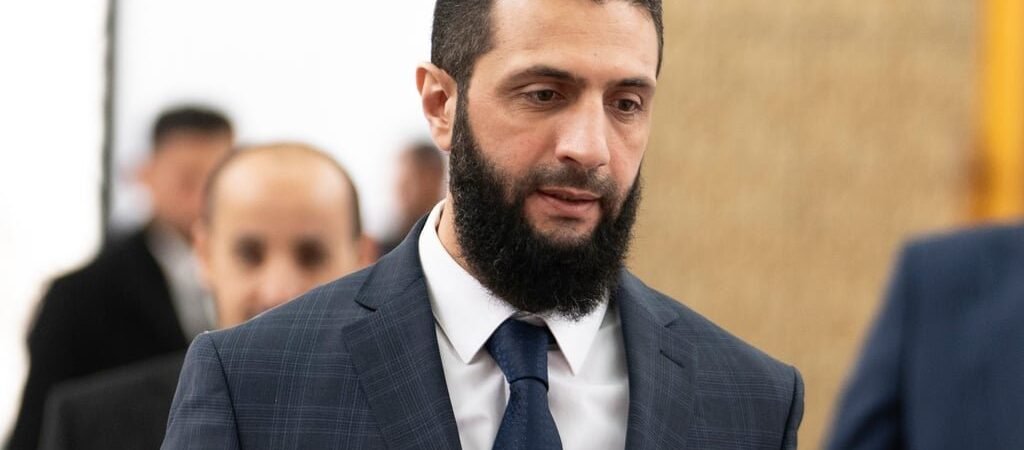In a dramatic development that has sent shockwaves throughout the Middle East, Turkey has ordered Ahmed al-Sharaa president of Syria since January 2025, to vacate the Presidential Palace in Damascus. This directive comes just months after al-Sharaa’s vertiginous rise to office following the Assad regime’s spectacular collapse on December 8, 2024. His leadership, underpinned by Turkish military support and his own militia coalition Hay’at Tahrir al-Sham (HTS) appeared to mark a new dawn for Syria. However, the latest turn of events suggests that the fragile coalition underpinning his presidency may be unraveling.
Al-Sharaa’s journey from U.S.-designated terrorist with a $10 million price tag on his head to assuming Syria’s highest office is nothing short of extraordinary and controversial. Previously the commander of Jabhat al-Nusra, the Syrian al-Qaeda affiliate that was later rebranded as HTS, al-Sharaa embodied the most radical fringes of the Syrian opposition.
But following more than a decade of horrific civil war, shifting geopolitical tides, and waning international interest, the power vacuum created by Assad’s fall in late 2024 made space for unconventional leadership. Riding Turkish support and a pragmatic accommodation with powerful minority groups such as southern Syria’s Druze, al-Sharaa presented himself not merely as a militant leader, but as a transitional figure who had the ability to hold a disintegrating country together
His guarantee of relative order, local administration and protection of religious minorities won him limited, albeit grudging, legitimacy in key regions. Some even compared him to past revolutionary leaders who later donned the attire of statehood. However, the international community remained highly distrustful.
Al-Sharaa’s rise would not have been possible without Turkey’s military and logistical support. Ankara, weary of Kurdish self rule on its border and seeking to have a say in the future of post-Assad Syria, saw al-Sharaa and HTS as a useful, if uncomfortable, ally. The Turkey backed campaign that toppled Assad was swift and decisive with HTS playing a leading role.
However, this alliance was never more than provisional. Al-Sharaa’s extremist past, ideological rigidity and the dominance of his militia within Syrian institutions were in direct opposition to Turkey’s conception of a moderate Sunni led post war government open to regional integration and international acceptance.
Reports now indicate that Turkey has grown increasingly frustrated with al-Sharaa’s refusal to step back from military control and his failure to rein in HTS hardliners. The instruction to vacate the Presidential Palace, as reported, may be an indication of Ankara’s wish to replace him with someone more accommodating or at least to force through a reconfiguration of the transitional government more aligned with Turkish strategic interests.
The Turkish move is profound in its implications. It questions the durability of Syria’s current leadership and highlights the inherent instability of a regime based on militia power, foreign sponsorship and war opportunism. While al-Sharaa has made symbolic gestures toward diplomacy including his controversial agreement with Druze leaders in early 2025 assuring protection and autonomy critics say that such overtures are empty.
Furthermore, al-Sharaa’s violent history essentially delegitimizes his authority. The U.S. State Department listing in 2017 that added HTS to the roster of al-Qaeda affiliates was never withdrawn. His rule is still viewed by many global players as the hijacking of Syria’s future by militant extremists.
International reaction has been muted thus far but cautious. The United States, the European Union, and the Gulf nations have not officially recognized al-Sharaa’s government yet. Israel has expressed concern about HTS’s proximity to the Golan Heights, and Iran Assad’s longtime partner has condemned the regime change as illegal.
Russia, pushed to the side during the last few months of the Assad regime because of overextended forces and internal pressures, has not yet rebalanced its Syria strategy. Turkey, on the other hand, is trying to walk a fine line: having influence in Syria without getting bogged down in another quagmire.
If reports that Turkey has instructed al-Sharaa to vacate the palace are accurate, Syria may be facing another crisis of power. HTS still controls significant parts of northern Syria, and any effort to force out al-Sharaa by force could ignite intra-rebel clashes or a backlash that further destabilizes Damascus.
There are speculations that Turkey is going to push for a broader transitional council, which would include members of the Syrian National Army (SNA), political leaders in exile, and representatives of religious and ethnic minorities. Some others foresee a fall back into anarchy if HTS chooses confrontation over compromise.
Ahmed al-Sharaa’s rapid rise and potential fall underscore the complexity of post conflict Syria. His presidency represents both a break from Assad’s tyranny and a troubling continuation of militia rule and foreign involvement. Whether this latest twist represents the beginning of a peaceful transition or the harbinger of more violence will depend in large measure on how cautiously both HTS and Turkey navigate the next few days.
For Syrians, the dream remains the same: a stable, sovereign, and inclusive future unsullied by warlords, foreign proxies, and extremist ideologies. Whether that dream can survive the next chapter of Syria’s chaotic history remains to be seen.
The Rise and Possible Fall of Ahmed al-Sharaa: Turkey’s Changing Calculus in Syria



